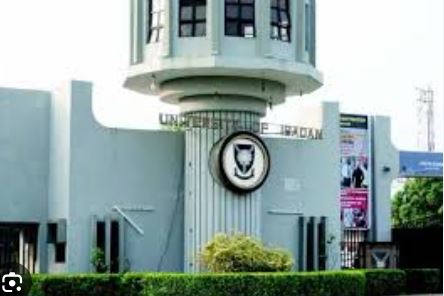Severe Flood Submerges University Of Ibadan Hostels, Causes Extensive Damage

A devastating flood has wreaked havoc at the University of Ibadan, one of Nigeria’s premier academic institutions, causing significant damage to property and essential materials. The flood, which occurred on Friday, submerged parts of the campus, destroying books, foodstuffs, documents, and other valuables, with early estimates suggesting losses worth millions of naira.
The most severely affected area was the students’ residential hostels, particularly the Awolowo (Awo) Hall. According to multiple reports, the floodwaters completely submerged several rooms, particularly those on the underground floor, leaving students’ belongings floating in the water. A resident of the institution, who chose to remain anonymous, expressed the depth of the destruction: “The most affected hall of residence is Awo Hostel, where about 16 rooms in the underground floor were completely submerged with students’ property floating on the water.”
A student who witnessed the aftermath recounted the situation, noting the damage caused by the flood, especially to students’ academic and personal materials: “The students’ foodstuffs, documents, and property, especially those who were in the middle of their examinations, were destroyed. The flood took over students’ rooms, toilets, kitchens, and all the entrances to their hostel. It took over my friend’s room, and destroyed everything she has, including the ones in her cupboard.” The emotional toll on the students, already stressed with academic activities, has been exacerbated by the loss of personal belongings, including food, clothing, and academic materials critical to their success.
For many, the timing of the flood could not have been worse. As it coincided with the examination period, some students left their rooms early in the day to focus on their studies, only to return to find their rooms engulfed by floodwaters. Many crucial academic documents, textbooks, and personal items that were left behind have been completely ruined, adding to the anxiety and uncertainty that students face during examinations.
Eyewitnesses revealed that the flood’s impact wasn’t limited to the hostel rooms. The water inundated kitchens, toilets, and corridors, making access impossible. Students stranded outside the hostels had no choice but to wade through waist-deep water to try and salvage what they could from their rooms. Despite their efforts, much of the damage was irreversible.
The cause of the flood has been attributed to heavy rainfall, which exceeded the capacity of the university’s drainage system. This left many buildings, including residential hostels, vulnerable to the overwhelming force of the water. The drainage systems in and around the university have long been a subject of debate, as the institution, like many in Nigeria, struggles with aging infrastructure that cannot accommodate the intensity of current weather patterns exacerbated by climate change.
This latest flood has raised renewed concerns over the preparedness of the university in handling environmental disasters, with students and staff questioning the effectiveness of the institution’s infrastructural planning. The frequency of such incidents in recent years has led to calls for a major overhaul of the university’s drainage systems, along with other preventative measures that can help mitigate future occurrences.
Many students are also left wondering about the university’s response to their loss, with expectations of possible compensation or assistance in replacing destroyed materials. University management has yet to issue a formal statement addressing the situation, but calls for urgent intervention and relief have been growing.
Parents and concerned stakeholders have urged the institution to provide immediate assistance to the students, many of whom now face additional financial and academic hardship due to the disaster. Others have pointed to the need for external intervention, calling on state and federal authorities to help the institution not only recover from this event but also take steps to prevent future disasters of this magnitude.
For the University of Ibadan community, this flood is a stark reminder of the vulnerability many institutions face in the face of changing climate patterns and inadequate infrastructure. As students attempt to salvage what remains of their personal and academic materials, the broader question remains: how can institutions like the University of Ibadan prevent such catastrophic losses in the future?
More details on the extent of the damage and the university’s response are expected in the coming days, but for now, the immediate concern is the welfare of the students who have lost significant portions of their property and their sense of security.



